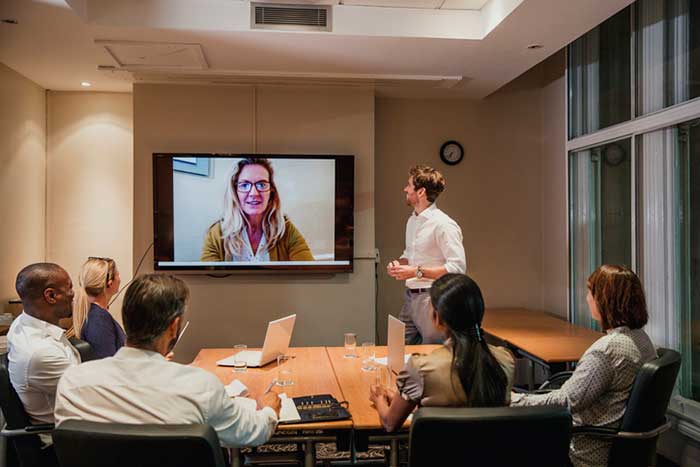How legal video depositions help in reaching favorable settlements
The Value of Legal Video Depositions in Modern Legal Services: What You Ought to Know
Legal video clip depositions have actually ended up being necessary in today's lawful landscape. They offer a multidimensional view of witness statements that conventional transcripts merely can not match. By recording both non-verbal and verbal communication, these depositions enhance the total understanding of a witness's trustworthiness. Nevertheless, the effectiveness of video clip depositions depends upon various factors, consisting of conformity with legal criteria and finest practices (legal video depositions). Checking out these elements exposes their true relevance in modern lawful solutions
What Are Lawful Video Depositions?
Legal video depositions act as a vital device in the lawsuits procedure. They involve tape-recording witness statements in a video clip layout, capturing both verbal and non-verbal interaction. This technique enables attorneys to document the behavior, expressions, and responses of witnesses, giving a richer context for the testimony. Generally carried out in a controlled atmosphere, these depositions are led by attorneys who ask concerns while a stenotype reporter records the dialogue. The resulting video clip can be important for test preparation, as it enables attorneys to examine the reputation of witnesses and improve their approaches. In addition, lawful video clip depositions can be made use of in different legal contexts, ranging from civil disputes to criminal instances. The acoustic and aesthetic aspects of video depositions enhance the discussion of evidence, making it a vital part in the modern-day legal landscape. Overall, they add significantly to the effectiveness and effectiveness of lawful proceedings.

Benefits of Video Depositions Over Standard Methods
Video depositions provide numerous advantages contrasted to traditional techniques of taking witness testaments. One significant benefit is the capacity to capture both audio and aesthetic elements, offering an extra thorough record of the witness's declarations. This twin style improves quality and permits lawyers to reference certain subtleties throughout trial preparation. Furthermore, video clip depositions promote remote participation, making it simpler for witnesses who may be not available for in-person looks due to geographical constraints or health and wellness issues.Moreover, video depositions can accelerate the general deposition procedure, minimizing the moment and prices related to travel and logistics. They also enhance accessibility, as tape-recorded depositions can be easily shared among legal teams and referenced at any moment. This benefit adds to better case management and prep work. On the whole, video depositions stand for a modern-day, reliable technique to collecting witness statements, aligning with the developing needs of the legal career.
The Role of Body Movement and Tone in Testimonies

In legal video clip depositions, body movement and tone play important roles in sharing a witness's integrity and dependability. Nonverbal cues can supply insights right into a witness's mood, affecting how their testament is viewed. Recognizing the effect of these components is vital for jurors and lawyers alike when reviewing the reliability of a testament.
Nonverbal Communication Insights
While verbal communication is often emphasized in lawful testimonies, nonverbal hints such as body movement and tone play a vital duty in conveying reputation and emotion. Onlookers of depositions might note that a witness's pose, motions, and facial expressions can significantly affect assumptions of dependability. Constant eye call may signify self-confidence, while avoiding look might recommend dishonesty or pain. The tone of voice-- its quantity, pitch, and rate-- can pass on feelings of sincerity or uncertainty. Lawyers must be attuned to these nonverbal signals, as they commonly give crucial context that matches spoken words. Understanding these nuances can boost the performance of depositions and affect the result of lawful process.
Emotional Tone Impact
The emotional tone shared throughout legal testimonies greatly impacts how a witness is regarded. Body movement, vocal inflections, and face expressions play essential roles in shaping the narrative of a testament. A witness displaying confidence via consistent eye contact and a tranquil tone can impart a sense of integrity and involvement. Alternatively, signs of anxiousness, such as fidgeting or an unstable voice, may bring about uncertainty regarding their account. The nuances of psychological expression can influence the analysis of facts, making it essential for lawful professionals to acknowledge these cues. In video depositions, the auditory and visual parts integrate, stressing the importance of psychological tone in conveying sincerity and truthfulness within the lawful process.
Integrity and Trustworthiness
A crucial consider establishing reputation and credibility throughout testimonies depends on the witness's body movement and tone of voice. Onlookers commonly depend on non-verbal cues-- such as eye get in touch with, position, and motions-- to analyze a witness's sincerity. A witness who preserves eye call and presents open body language might be regarded as even more straightforward and reliable than one that stays clear of eye call or shows up closed off. Furthermore, tone of voice plays a vital duty; a constant, tranquil tone can strengthen the integrity of the testament, while changes in pitch or volume may raise uncertainties. Ultimately, the combination of body movement and singing tone considerably influences how a witness's see page declarations are gotten and translated in a lawful context.
Finest Practices for Performing Video Clip Depositions
Carrying out video clip depositions requires careful preparation and implementation to ensure a reliable and clear discussion of statement. Initially, it is necessary to select a quiet, well-lit area to lessen interruptions and secure optimum video quality. The equipment ought to be examined ahead of time, including electronic cameras, microphones, and illumination, to stay clear of technical concerns during the deposition.Next, celebrations included must examine the format and procedures ahead of time, ensuring that every person understands their functions. The deponent needs to be briefed on the process, consisting of how to respond plainly and concisely.Additionally, keeping a professional temperament throughout the session is vital. This includes avoiding from talking over each other and verifying that all inquiries are routed appropriately. It is vital to videotape the deposition in a layout that allows for very easy playback and evaluation, protecting the integrity of the testimony for future use.
Legal Considerations and Conformity Issues
Just how do lawful factors to consider and conformity concerns influence the performance of video clip depositions? Lawful experts need to browse a complicated landscape of guidelines, making certain that video clip depositions comply with administrative policies and requirements. Conformity with regulations worrying personal privacy, approval, and taping techniques is necessary. For example, acquiring explicit approval from all celebrations included is necessary to avoid lawful repercussions.Additionally, the admissibility of video evidence in court can rest on conformity with procedural demands. Making sure that the equipment made use of satisfies technological requirements is additionally crucial, as poor top quality can weaken the deposition's reliability.Moreover, lawyers need to be aware of any kind of particular state regulations that control video depositions, as these can differ considerably. Failure to attend to these considerations can not only threaten the stability of the deposition yet also impact the overall instance method, eventually influencing the customer's lawful end results.
How Video Depositions Impact Court Perception
While video clip depositions can work as effective tools in lawful process, their influence on court perception is considerable. The aesthetic and auditory components of video recordings offer jurors with an extra comprehensive understanding of witness behavior, credibility, and emotional actions. This multimedia strategy can enhance the jurors' capability to examine the integrity of testament compared to typical text-based transcripts.Moreover, video clip depositions permit jurors to observe body language, tone of voice, and facial expressions, all of which can impact their interpretation of the witness's statements. The existence of a witness on screen can humanize them, fostering empathy and connection, which may sway jurors' opinions. On the Our site other hand, a witness who appears untrustworthy or incredibly elusive on video may result in unfavorable assumptions that influence a jury's choice. Inevitably, the vibrant nature of video clip depositions plays an essential duty in forming exactly how jurors translate proof and reach their judgments.
The Future of Video Clip Depositions in Legal Method
As improvements in innovation continue to reshape the lawful landscape, the future of video clip depositions is poised for considerable development. Advancements such as expert system, online truth, and enhanced video clip conferencing devices are expected to improve the deposition process and boost access. Legal professionals might use AI-driven analytics to evaluate witness reliability and instance stamina a lot more effectively.Moreover, the assimilation of digital reality might enable courts to experience immersive simulations of depositions, supplying much deeper context and understanding. Additionally, the pattern toward remote depositions is most likely to persist, supplying higher flexibility for attorneys and customers alike.As remote job ends up being increasingly normalized, video clip depositions will likely end up being standard practice, minimizing expenses and time constraints connected with traditional techniques. On the whole, these technological innovations promise to enhance the efficiency, performance, and availability of video depositions in lawful practice, ultimately changing just how lawyers get ready for test.
Frequently Asked Concerns
Just How Much Do Legal Video Depositions Typically Cost?

Can Video Clip Depositions Be Made Use Of in Any Type Of Kind Of Case?
Video clip depositions can be used in various kinds of cases, consisting of civil, criminal, and family members legislation. Their flexibility permits lawyers to present witness testaments successfully, adapting to the details demands of various legal scenarios.
What Devices Is Needed for a Video Clip Deposition?
To conduct a video clip deposition, necessary equipment consists of a top notch cam, microphone, illumination, and a reputable recording tool. Furthermore, a computer system with modifying software might be necessary for post-production and formatting the final video clip.
Exactly how Long Does a Normal Video Deposition Last?
A normal video clip deposition lasts between 2 to 4 hours, depending upon the intricacy of the case and the number of inquiries positioned. Extensive sessions may happen, yet breaks are usually integrated for individual convenience.

Are Video Clip Depositions Admissible in Court?
Video clip depositions are usually permissible in court, given they abide by lawful criteria and regulations of proof. Their usage improves clearness and protects witness testament, helping in the judicial process during hearings and tests. Lawful video depositions have become essential in today's lawful landscape. In addition, lawful video clip depositions can be used in various legal contexts, varying from civil conflicts to criminal cases. Additionally, video clip depositions assist in remote involvement, making it simpler for witnesses that might be not available for in-person appearances due to geographical constraints or wellness issues.Moreover, video depositions can expedite the total deposition process, reducing the time and prices connected with travel and logistics. Making certain that the devices used fulfills technological standards is additionally essential, as great site inadequate high quality can undermine the deposition's reliability.Moreover, lawyers must be mindful of any details state legislations that govern video clip depositions, as these can vary substantially. Additionally, the fad toward remote depositions is most likely to linger, providing better versatility for customers and attorneys alike.As remote work comes to be progressively stabilized, video clip depositions will likely become typical practice, minimizing costs and time restrictions linked with conventional methods.